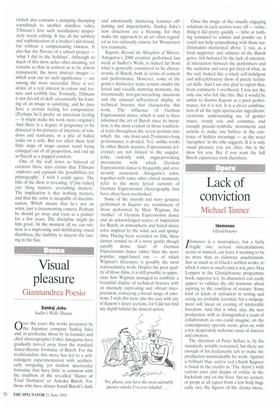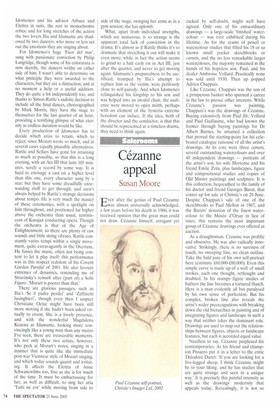Lack of conviction
Michael Tanner
Idomeneo Glyndebourne Tdomeneo is a masterpiece, but a fairly / fragile one: serious miscalculations, scenic or musical, can leave it seeming to be no more than an elaborate anachronism. Just as much as in Gluck's noblest works, to which it owes so much (and is not, pace Max Loppert in the Glyndebourne programme book, superior to), its characters can easily appear to validate the old nonsense about aspiring to the condition of statues. Some kind or kinds of stylisation in setting and acting are probably essential, but a misjudgment will mean an evening of intolerable boredom. And that is what, alas, the new production, with as distinguished a team of collaborators as one could imagine, on the contemporary operatic scene, gives us, with a few desperately welcome oases of interest and emotion.
The direction of Peter Sellars is, by his standards, notably restrained, but there are enough of his trademarks left to make the production unmistakably his work. Against a brilliant blue and/or red (Anish Kapoor is listed in the credits as 'The Artist') with various sizes and shapes of orifice in the backcloth and on the floor, but no scenery or props at all (apart from a few body bags early on), the figures of the drama move, Idomeneo and his advisor Arbace and Elettra in suits, the rest in monochrome robes; and for long stretches of the action the two lovers Ilia and Idamante are shadowed by two dancers, who more or less act out the emotions they are singing about.
For Idomeneo's huge Tuor del mar', sung with passionate conviction by Philip Langridge, though some of his coloratura is now sketchy, the dancers writhe on either side of him. I wasn't able to determine on what principle they were awarded to the characters, but they are a distraction, and at no moment a help or a useful addition. They do quite a lot independently too, and thanks to Simon Rattle's sadistic decision to include all the final dances, choreographed by Mark Morris, they have the stage to themselves for the last quarter of an hour, providing a terrifying glimpse of what eternity as endless duration would be like.
Every production of Idomeneo has to decide which arias to retain, which to reject, since Mozart wrote so much, and in several cases equally plausible alternatives. Rattle and Sellars have gone for retaining as much as possible, so that this is a long evening, with an Act III that lasts 105 minutes, surely a record by some way. It is hard to envisage a cast on a higher level than this one, every character sung by a star; but they have some dreadfully unrewarding stuff to get through, and aren't always helped by Rattle's strange decisions about tempo. He is very much the master of these ceremonies, with a spotlight on him throughout, and positioned far higher above the orchestra than usual, reminiscent of Karajan conducting opera. Though the orchestra is that of the Age of Enlightenment, so there are plenty of raw sounds and little string vibrato, Rattle constantly varies tempi within a single movement, quite extravagantly in the Overture. He fusses the music, often not being content to let it play itself; this performance was in this respect redolent of his Covent Garden Parsifal of 2001. He also favours extremes of dynamics, reminding me of Stravinsky's remark after (part of) a Solti Figaro: 'Mozart is poorer than that.'
There are glorious passages, such as Ilia's 'Se il padre perdei' and `Zeffiretti lusinghieri', though even then I suspect Christiane Oelze might have been still more moving if she hadn't been asked virtually to croon. She is a lovely presence, and with the wonderful Magdalena Kozena as Idamante, looking more convincingly like a young man than any mezzo I've seen, there are treasurable moments. It's not only these two artists, however, who peck at Mozart's notes, singing in a manner that is quite like the immediate post-war Viennese style of Mozart singing, and which today sounds quaint and irritating. It affects the Elettra of Anne Schwanewilms too, fine as she is for much of the time. It must be embarrassing for her, as well as difficult, to sing her aria `Tutti ne cor' while moving from side to
side of the stage, swinging her arms as in a gym session; she has aplomb.
What, apart from individual strengths, which are numerous, is so strange is the apparent total lack of conviction in the drama. It's almost as if Rattle thinks it's so dramatic that stretching it out will make it even more; while in fact the action seems to grind to a halt early on in Act III, just after the quartet, and never to get moving again. Idamante's preparedness to be sacrificed, trumped by Ilia's attempt to replace him as the victim, were perilously close to self-parody. And when Idomeneo relinquished his kingship to his son and was helped into an invalid chair, the audience were moved to open mirth, perhaps with an element of the hysteria extreme boredom can induce. If the idea, both of the director and the conductor, is that this should be represented as a timeless drama, they need to think again.



































































































 Previous page
Previous page